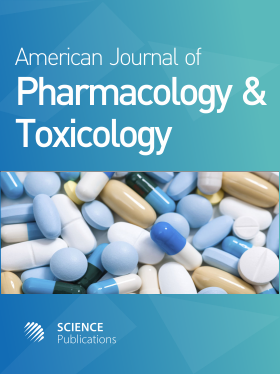ABSENCE OF VISIBLE TOXIC EFFECTS ACCOMPANYING THE SHORT-TERM ADMINISTRATION OF AN AQUEOUS EXTRACT OF ALLIUM SATIVA LINN. IN MALE SPRAGUE-DAWLEY RATS
- 1 University of Ghana School of Pharmacy, Ghana
- 2 University of Stellenbosch, South Africa
- 3 University of Ghana Medical School, Ghana
Abstract
Allium sativum is cultivated in the northern part of Ghana and has gained widespread use as chemoprotective, in curing hypertension, impotence and erectile dysfunction. The multipurpose use together with its aphrodisiac activity has resulted in the widespread use of this plant medicine both in meals and as herbal medications. Safety assessment of this plant however is rare. The present study is designed to evaluate the toxic effect of the aqueous extract of Allium sativa on the prostate, heart, liver kidney and haematological parameters after a shorterm administration in male-sprague-dawley rats. The following doses were used in different groups of male Sprague-Dawley Rats: 5000, 3000 and 1000 mg kg-1. The following parameters were monitored: Clinical Chemistry, Gross and Histopathology (Heart, kidney, liver and prostate). No death was recorded at the highest dose of 5000 mg kg-1. ASE reduced levels of urea and creatinine but increased levels of liver enzymes ALT, AST, ALP and bilirubin levels as compared to the controls. There was a statistically significant increase in WBC count (p<0.005) in all the doses except the median dose. There were no significant change in Red Blood Cell count (RBC) (p<0.003), Haemoglobin (HGB) (p<0.03), Haematocrit (HCT) p<0.0001), Mean Corpuscular Volume (MCV) Other parameters remained relatively unchanged. Gross pathology did not reveal any abnormality. Histopathological analysis showed that the extract did not have any adverse effect on the integrity of these organs. The results were within histopathological limits and did not reveal any abnormality in the examined organs namely: The prostate, kidney, liver and heart which maintained their integrity after the dose administration. Observations were within histopathological limits. ASE is reasonably safe when administered by the oral route within dosages of 1000-5000 mg kg-1 in Sprague dawley rats. This research has provided the safety implications as to the use of this plant.
DOI: https://doi.org/10.3844/ajptsp.2014.53.67

- 4,119 Views
- 3,461 Downloads
- 2 Citations
Download
Keywords
- Allium sativum
- Aphrodisiac
- Liver
- Prostate
- Histopathology
- Subacute Toxicity
